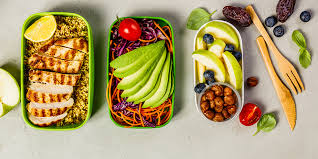
We build our tastebuds at an early age and mostly like food that is only tasty but not healthy. Eating right is art without which you can’t satisfy your tastebuds and fulfil your nutrition requirement at the same time. If you are confused with a healthy diet, balanced diet and food that can nurture your mind, body and soul at the same time, this article is for you!
What is a Balanced Diet?

A diet that fulfils the need of different nutrition with certain quantity and proportion of food to supply calories, vitamins, minerals, proteins, and other nutrients in the required amount. A Balanced Diet has the right nutrients in the right quantity that your body can absorb at a time to supply the right nutrients.
What Fuels Your Body and Mind?
It is always recommended to consult a dietician for the right diet chart according to your health. Just for the reference, you can follow this diet chart on a daily basis for a healthy adult.
Daily average intakes for adults:
Protein: 50g
Salt: less than 6g
Total fat: less than 70g
Saturates: less than 20g
Carbohydrate: at least 260g
Energy: 8,400kJ/2,000kcal
Total sugars: 90g
Right Choice for a Teenager

Fruits & Veggies: The average intake of fruits and vegetables for a teenager should be 2 cups to supply 2000 calories on a daily basis.
Iron-Rich Foods: Dried beans, peas, lean beef, iron-rich cereals, bread, or spinach are required to supply iron for growth and strength. Right supply of iron is very important for teenagers.
Calcium-Rich Food: The average intake of calcium on a daily basis should be 1300Mg. A teenager should intake 3 cups of calcium-rich food at regular intervals on a daily basis. The right choice should be 1 cup of milk in morning & evening and a cup of yoghurt with afternoon meal. You can also include 2 ounces of fat-free American cheese or 1½ ounces of low-fat cheddar cheese.
Protein Rich Food: To maintain 50g of protein on a daily basis to build and repair muscles and other organs of the body, you need to intake 5½ ounces of protein-rich foods on a daily basis. Fish, Lean Meat, poultry products, one egg, ½ cup of beans or tofu, 10g of peanut butter, and ½ ounce of nuts or seeds.

Whole Grains Cereals: Whole grain and cereals are the best sources of fibre. A teenager should take average of 6 ounces of grains on a daily basis. This may include one slice of bread or ½ cup of pasta made of whole grain, brown rice, or cereals.
Controlled Fat: the average intake of fat should not exceed more than 70g. Your first choice should be unsaturated fat that is available in salmon fish, tuna fish, olive, corn, soybean oil, nuts & sunflower seeds, and other such food items.

Image Source: CalmSage
Dark Chocolate: It is an important antioxidant to support your brain health. The presence of cacao and flavonoids that helps in memory problems.
Fatty Acids: The presence of Omega 3 Fatty Acids in Salmon or Tuna fish are good for your brain, membrane and retina. It strengthens the cell membrane present in your brain.
Mindful Eating Practices
Just eating isn’t enough to give the right nutrition to your body. You need to practice it the right way!
- Avoid eating big meals especially before going to bed.
- Add Vitamin-D3 to your diet if you give less exposure to sunlight.
- Avoid processed junk food and food items with unhealthy ingredients.
- Eat food in silence to relish the flavours and give proper attention to your food.
- Eat slowly, chew properly to avoid putting load to your intestines and weight gain.
- Drink plenty of water to increase metabolism, burn calories and balance what you eat.
- Establish a healthy food and body relation by paying attention to responses from your body for a certain food item. How your body reacts is also important to decide the right food.
- Eat only when you feel hungry or your body demands nutrition. Eat only what fuels your body else it’s a total waste.
- Coffee is good if it is taken at the right time as it cures Alzheimer’s and other diseases.
- Take proper sleep to boost your appetite hormones, physical and mental energy.
- Exercise is good but if you don’t, then add some cardio in your daily routine.
- Ensure the right intake at the right time to gain full benefits of what you eat.
- Avoid smoking, taking drugs and intake of high consumption of alcohol.
- Minimize the intake of sugar levels or carbonated water (Soda).
- Use dietary assessment tools and calculate your intake.
Summing Up
There is a lot that we can change to make the right eating choices. If any part of your body is giving week signals, your diet should focus on repairing the damage however to maintain balanced health, a balanced diet is required. Also, a proper workout is required to digest what you eat and gain the most out of your diet. You should focus on satisfying your nutrition requirement first and then consider cheat days to satisfy your tastebuds.


